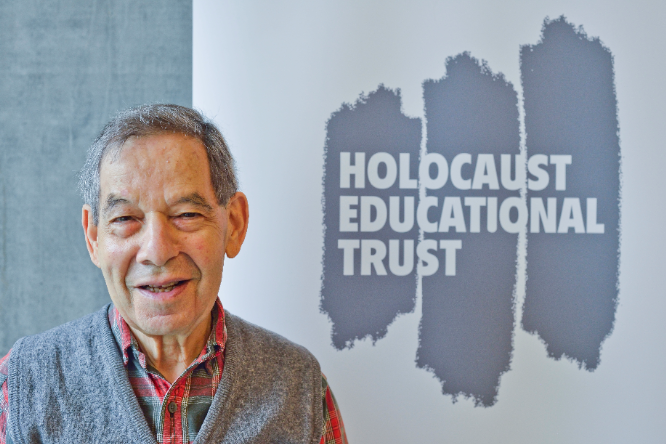The Holocaust Educational Trust is deeply saddened to learn of the loss of our friend Rudi Oppenheimer BEM.
Karen Pollock MBE, Chief Executive of the Holocaust Educational Trust said:
“Rudi was a survivor of Bergen-Belsen, who dedicated the latter part of his life to ensuring that young people understood the trauma of his childhood under Nazi-occupied Europe. He spoke to an extraordinary number of schools, and was incredibly proud to have done so. When Rudi gave his testimony, it felt like he was still the child he was then - it was heart wrenching.
From meeting HRH Her Majesty the Queen in the concentration camp in which he was imprisoned, to speaking to tens of thousands through the Trust’s live webcast, Rudi played a key role in Holocaust education in the UK.
“Rudi was part of the Holocaust Educational Trust family and we will miss this brave and wonderful man. Our thoughts and prayers are with his family and friends. We will do all we can to ensure his story and legacy continues to be shared across the country.”

Rudi was born in 1931 in Berlin and lived there with his parents and his older brother Paul until he was four years old. From there, his family moved briefly to Britain, where his sister Eve was born, and then to Heemstede in the Netherlands.
In May 1940 German troops invaded the Netherlands.
In June 1943, Rudi and his family were rounded up and sent to the transit camp Westerbork, situated close to the German border in the north-east of the Netherlands.
Because Rudi’s sister Eve had been born in the UK, Rudi's family were classified by the Nazis as 'Exchange' Jews which meant that they might be exchanged for Germans interned by the allies and were to be exempt from measures taken against other Jews. This status allowed Rudi and his family to remain in Westerbork until February 1944, when they were deported to Bergen-Belsen.
As Exchange Jews, Rudi and his family received certain privileges in Bergen-Belsen: they lived in separate compounds from the other prisoners; they didn’t have to wear the striped uniforms that other prisoners were forced to wear, they didn’t have their hair shaved and they were able to keep their luggage. However, conditions in Belsen deteriorated rapidly in 1944 as increasing numbers of Jewish prisoners were brought to the camp from Auschwitz-Birkenau and elsewhere. As a result, Rudi and his family suffered increasingly dire living conditions during the winter of 1944-45. With tens of thousands of prisoners now arriving, overcrowding, starvation and disease were rife. In January 1945, Rudi's mother fell severely ill and died. His father died just two months later.
On 10th April 1945 Rudi and Paul left on the last train to leave Bergen-Belsen. After travelling for 14 days they awoke on the train to find that the SS guards had gone; the brothers recognised soldiers from the Red Army and realised that they had been liberated. With the help of the Soviets, they managed to get to Leipzig, where they were reunited with Eve - she had been on the same train as them but in a different section. In June 1945, almost exactly two years after their deportation from Amsterdam, they arrived in Maastricht.
The Oppenheimer siblings had an uncle and aunt in London, so they came to Britain after the war. Eve, who had a British passport, arrived in September 1945, followed by Rudi and Paul, who had to wait for their papers, in November.
Rudi’s family story is told in Paul’s book, ‘From Belsen to Buckingham Palace’, and Rudi shared his story with many tens of thousands of people across the UK and abroad. He met the Queen during her visit to Bergen Belsen in 2015, and frequently spoke to our political leaders. However, he took most pride in his work with young people and worked tirelessly to ensure that the next generation would understand one of the darkest periods of human history. He always believed that young people have the power to make a positive change in the world and his contribution to Holocaust education will not be forgotten.